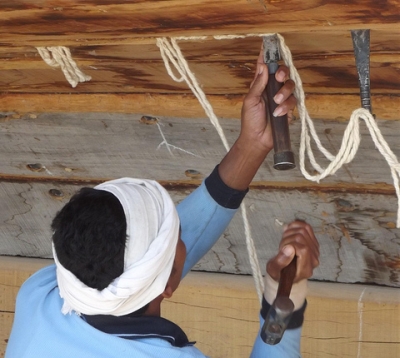Caulkers: Fastening Onto God
Caulkers: Fastening Onto God
1 Samuel 30:6
I am easily discouraged, easily frustrated and easily disheartened.
David also felt overwhelmed by discouragement, distressed by circumstances of loss and weakness, or confused about what to do and where to go. He often felt pain from circumstances that were allowed and orchestrated by God.
Recently I read of an instance in which David responded to a horrendous experience of loss and violence by "strengthening", or fastening, himself in God:
"David was greatly distressed, for the people spoke of stoning him, because all the people were bitter in soul, each for his sons and daughters. But David strengthened himself in the Lord his God."
1 Samuel 30:6 (ESV)
David's small army had been on the front lines of war, away from their homes for three days. During that time, Amalekites had raided their hometown of Ziklag, burning it with fire and taking captive the women and all who were in it. David and his men returned home to find it empty and destroyed.
"When David and his men came to the city, they found it burned with fire, and their wives and sons and daughters taken captive. Then David and the people who were with him raised their voices and wept until they had no more strength to weep."
1 Samuel 30:3-4 (ESV)
David's soldiers burned with anger against their commander, and David's heart froze in fear and loneliness:
"David was greatly distressed, for the people spoke of stoning him, because all the people were bitter in soul, each for his sons and daughters."
1 Samuel 30:6 (ESV)
David sought comfort and courage from only one Source:
"David strengthened himself in the Lord his God."
1 Samuel 30:6 (ESV)
"Strengthened" means to fasten upon, to seize. The Hebrew word is often translated as "strong", either in body or heart, or as in building or repairing things. In one instance this word is translated as "caulker", a person who drives tarred cotton into the seams between the planks of a wooden ship or boat (see Ezekiel 27:9). This word, "caulker", gives us a vivid illustration of how David may have "strengthened" himself in God.
In the chapters of the Old Testament that led up to to the violent assault on David's home and family, we can see descriptions of many different circumstances which David experienced, some good experiences, but also many bad experiences.
Yet all that happened to David was completely under God's sovereign knowledge and control.
"Know therefore today, and lay it to your heart, that the Lord is God in heaven above and on the earth beneath; there is no other."
Deuteronomy 4:39 (ESV)
Because God is Creator, with unlimited power and knowledge, He has ultimate authority over who dies and who lives, who suffers harm and who is rescued:
"See now that I, even I, am he, and there is no god beside me; I kill and I make alive; I wound and I heal; and there is none that can deliver out of my hand."
Deuteronomy 32:39 (ESV)
All of David's experiences, good and bad, had led to that very moment of distress and discouragement. All of the circumstances in which God had placed David were very much like wooden planks which a builder uses to make a boat. Each plank is hewn, cut, chiseled or trimmed according to the shipbuilder's plan, just as David's life was built upon all of the different experiences and circumstances (good and bad) given him by God.
A caulker is a person who "fastens" each plank together to form a water-tight covering for the boat. The gaps between the planks are stuffed tightly with cloth or fiber, sometimes smeared with tar or resin. Without adequate caulking, water pressure would force leaks through hundreds of tiny gaps between the planks. The boat would sink immediately after launching into the sea.
David must have been acting as a spiritual "caulker" when he strengthened himself in God. He must have consciously reminded himself of past experiences, both good and bad, "fastening" together each experience with the knowledge that God knew about each one. David must have recalled God's words of promise given years before, driving the truth of God into the events that had shaped his life to that point, both the good and bad parts of his life.
We can do the same.
We must do the same.
We must take each circumstance and "smear" it with the truth and hammer it tightly into every gap of faith: God knows. God cares. God is utterly powerful.
And God is utterly good.
"Good" doesn't always mean "pleasant". In truth, "ultimately good" often requires "temporarily bad" experiences. However, "ultimate good", by definition, means "ultimately best". God cares too much, He loves us too much, too allow us simply to be "happy", especially when that temporary "happiness" would ultimately be harmful or destructive.
David "strengthened himself in the LORD his God", which means "to fasten upon" God.
To strengthen yourself in God means to cover every experience with what we know to be the truth about God.
Thank God for "caulkers"!
photo credit: gordontour via photopin cc




Comments
Post a Comment